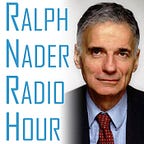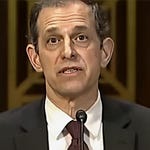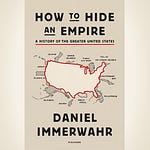In a fascinating interview, where the historian gets questioned by one of the main subjects of his history, Ralph welcomes professor Paul Sabin to discuss his history of the public interest movement, “Public Citizens: The Attack on Big Government and the Remaking of American Liberalism.” Plus, intrepid investigative reporter, Allan Nairn joins us to give us his take on U.S. culpability in the violent history of Afghanistan.
Paul Sabin is Professor of History and American Studies at Yale University, where he coordinates the Yale Environmental History working group and the Yale Environmental Humanities Program. He is the author of Public Citizens: The Attack on Big Government and the Remaking of American Liberalism.
If you look at that period from 1968 to 72… [there was] a huge outpouring of legislative action. That was very impressive and successful, and then a wave of litigation that follows is successful. But I think that even some of the people who I interviewed, looking back at this time, have thought “Well, actually, we made a bit of a strategic error. We went for these easier tactical wins, but we neglected to build a larger social movement. And we neglected to develop a rhetorical strategy that would win over the public and build a broader constituency.”
Paul Sabin, author of Public Citizens: The Attack on Big Government and the Remaking of American Liberalism
When I go back and look at the writings from the early 1970s and read what activists were saying, there’s a lot of disparagement and a sense of distaste about politics. The sense that politicians, the institutions of politics were corrupted and would corrupt. Even good people who went into the government or into elected office would be corrupted by the situation. And I think that really led to an idea that there was something pure outside, in the nonprofit sector, where the true public interest could be identified and articulated. And there was a bit of a reluctance to make some of the compromises and wade into the institutional challenges of, whether it’s the Democratic Party or other settings, to try to change those. And to wield the actual institutions of power.
Paul Sabin, author of Public Citizens: The Attack on Big Government and the Remaking of American Liberalism
Here’s what we were thinking [in the 1960s and 1970s]… One: we had a very short time span. We were very aware [of] American history, where you have spurts of progressivism and then the counterattack comes– largely from corporations and their influential allies in government. The second thing is that we weren’t about to compromise because our definition of compromise is “let your adversary, like General Motors, force you to compromise.” Don’t help them along the way.
Ralph Nader
I put [the liberals’ Carter-era struggle] as the struggle to articulate a vision of government that was more nuanced. that both asserted a positive vision of government that could act to protect the public interest, that could that could do big significant things. But that also acknowledged the criticisms of the government, and the ways that the government could be destructive, could be wasteful, and needed to be reformed.
Paul Sabin, author of Public Citizens: The Attack on Big Government and the Remaking of American Liberalism
I think that the challenge– and this goes back to what you’re saying about being able to articulate a broader philosophy and one that compels people and motivates them and leads to action– is how to translate that research and those ideas and those discoveries into policy or regulatory action… How do you both build trust in the government and create a mandate for the government to act, while also being aware of the criticisms of the government and the need to reform?
Paul Sabin, author of Public Citizens: The Attack on Big Government and the Remaking of American Liberalism
The big mistake we made isn’t in your book. The biggest mistake we made was that we didn’t move out and develop afterschool civic skill courses for middle school and high school. And getting more colleges to engage in not just Policy Studies but the ways and means of practicing democracy. That was the biggest failure [of the public interest movement].
Ralph Nader
Allan Nairn is an award-winning investigative journalist, who has reported on death squads in Central America, mass killings in Indonesia, and brutal paramilitary activity in Haiti. He has been jailed. He has been beaten. He has risked his life to tell the stories of brutal regimes, many of which have been backed by the United States. He has seen on the ground the bloody effects of those policies. Noam Chomsky called him one of the only true investigative journalists working today.
It’s an odd discussion (between the U.S. and the Taliban) because it’s a dialog between two mass killers: the locally- based mass killers of the Taliban, and the global mass killers [of] the United States military and security forces.
Allan Nairn, investigative journalist
[Since 1979] the US [has] viewed all the people of Afghanistan as pawns. [President Carter’s National Security Advisor Zbigniew Brzezinski] viewed their lives as pieces to be easily sacrificed for US whim. For his view of the game of empire. And that resulted in more than a quarter of a million deaths over the years that followed, the deaths in Afghanistan. And now we’re seeing the final endgame of Brzezinski and Carter’s move.
Allan Nairn, investigative journalist
Now, a policy that from the start was criminal, that included a willingness to violate international law by staging aggression, a willingness to violate international law and the local murder laws by killing civilians and engaging in war crimes and crimes against humanity… That US initiative, which involved really massive criminality, has now after so many deaths resulted in a final situation where there actually are real tragic choices and legitimate questions involved.
Allan Nairn, investigative journalist














